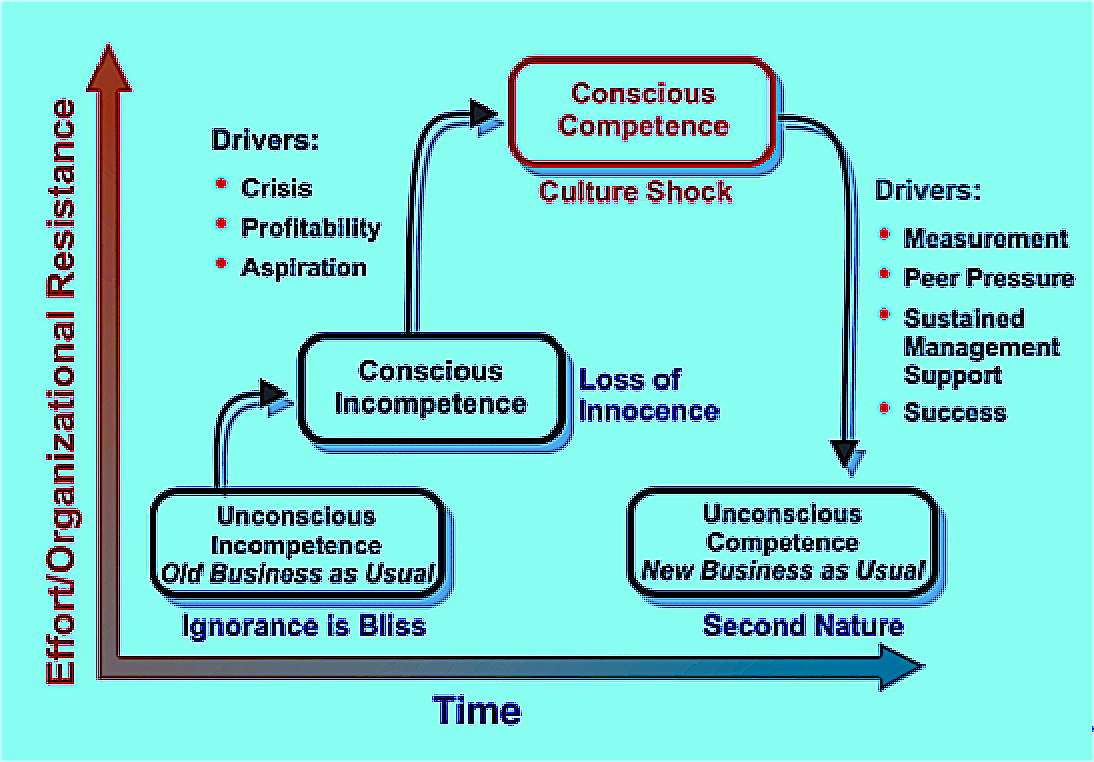Many “programs” intended to improve the reliability of plant assets provide only fleeting value before the organization drifts back into its old “business as usual” mode. The situation is easy to spot: Simply ask people why they execute a process in a particular way, and they respond, “It’s the way we’ve always done that.”
THE CHALLENGE
Building lasting organizational change is difficult. The fact that asset management requires alignment among numerous functional groups makes it particularly challenging. In their book Learning to Fly (2001 and 2004, Capstone Publishing, Chichester, UK), Chris Collison and Geoff Parcell offered some valuable insight on this subject. (see Figure). I’m explaining it here in asset-management terms.

In their book Learning to Fly, Chris Collison and Geoff Parcell described the path to organizational change.
Their points have value for those dealing with change in the asset-management arena.
As the authors noted, business as usual is a comfort zone for an organization and its people. Most prefer familiar over new and unfamiliar. Problems arise when business as usual leads to substandard performance. Collison and Parcell refer to this state as “unconscious incompetence.” We’re not very good at asset management, but we’re not aware of it, i.e., ignorance is bliss.
Then, someone in the organization reads an article or a book, attends a workshop or conference, speaks to a colleague, or discovers the incompetence. Our innocence is lost and we enter what Collison and Parcell categorize as state of “conscious incompetence.”
If we believe there’s value in closing the gap in organizational competence, we initiate a “program” to improve performance. Interestingly, while either crisis or aspiration can drive the initiative, crisis is often more compelling and motivating than the aspirational pursuit of increased profit or other improvements.
The “program” usually involves creating a plan and timeline; acquiring equipment and/or technology, where applicable; training people; and executing the plan. This places the organization and its people in a state that Collison and Parcell label “conscious competence.” We’re performing at a higher level of competency, but with more effort because everything is new, i.e., we have culture shock.
All too often, once implementation is completed, the program instigator moves on to the next program, resulting in the initiative losing its energetic leadership. Working in the state of conscious competence requires too much energy to sustain without unwavering leadership support. A common byproduct of this is organizational backsliding, with people returning to their comfort zone, i.e., the “old business as usual.”
That proverbial sword cuts two ways: First, investment in the program is lost. Second, it may be difficult to recover. The organization collectively says, “We tried PdM, RCM, TPM. . . , it didn’t work,” thus making it difficult, even impossible, to reestablish competent performance in the organization.
BOTTOM LINE
Asset management must be approached as a continual process, not as a “program” with defined start and stop points. After all, when do you want asset management to stop delivering reliability that improves safety, quality, sustainability, and profitability?
Therefore, it’s imperative that asset-management leaders provide sustained inspiration to help their organizations achieve what Collison and Parcell refer to as “unconscious competence,” i.e., we’re managing assets right. And, when asked why, people respond, “It’s the way we’ve always done that.”TRR
ABOUT THE AUTHOR
Drew Troyer has 30 years of experience in the RAM arena. Currently a Principal with T.A. Cook Consultants, he was a Co-founder and former CEO of Noria Corporation. A trusted advisor to a global blue chip client base, this industry veteran has authored or co-authored more than 250 books, chapters, course books, articles, and technical papers and is popular keynote and technical speaker at conferences around the world. Drew is a Certified Reliability Engineer (CRE), Certified Maintenance & Reliability Professional (CMRP), holds B.S. and M.B.A. degrees, and is Master’s degree candidate in Environmental Sustainability at Harvard University. Contact him directly at 512-800-6031 or dtroyer@theramreview.com.
Tags: reliability, availability, maintenance, change management, organizational change, workforce issues



